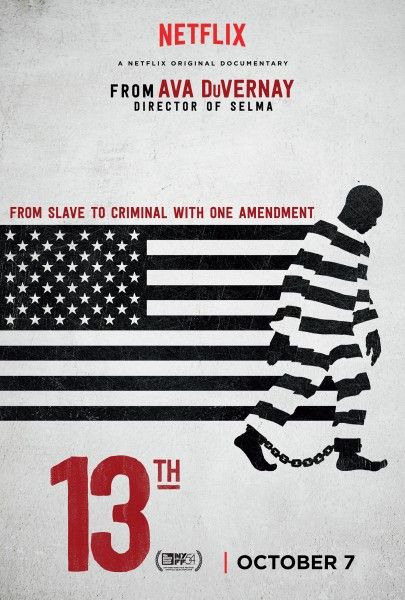Netflix has unveiled the first trailer for 13th, the new documentary from Selma filmmaker Ava DuVernay. While everyone was wondering what big film DuVernay would tackle after the critical acclaim she received from her Martin Luther King Jr. biopic (including discussions for Marvel’s Black Panther), she subsequently signed on to direct Disney’s upcoming blockbuster adaptation of A Wrinkle in Time, but she also went and made a timely Netflix documentary on mass incarceration with folks being none the wiser. And it comes out next month.
The title of 13th refers to the 13th Amendment of the Constitution, which abolished slavery in the United States but whose language also allows for slavery to remain legal as a punishment for convicted criminals. In her documentary, DuVernay explores the rise of mass incarceration, how it unfairly trends towards people of color, and what the ramifications have been for communities of color across the United States.
Interviews with experts abound, but folks will no doubt be intrigued by the inclusion of Newt Gingrich in this here trailer, which should hopefully assuage fears of “bias” in the making of the film. Mass incarceration is an American problem (we imprison our citizens at a higher rate than any other country in the world), and as a huge fan of DuVernay’s work thus far, I look forward to seeing what insight can be gained from this documentary.
13th will have its world premiere at the New York Film Festival, where it marks the festival’s first-ever documentary serving as the opening night film. We’ll have a review of the film from the festival sometime after its September 30th debut, but you won’t have to wait long to see it for yourself. 13th premieres globally on Netflix on October 7th.
Watch the trailer below.
Here’s the official synopsis for 13th:
The title of Ava DuVernay’s extraordinary and galvanizing documentary refers to the 13th Amendment to the Constitution, which reads “Neither slavery nor involuntary servitude, except as a punishment for crime whereof the party shall have been duly convicted, shall exist within the United States...” The progression from that second qualifying clause to the horrors of mass criminalization and the sprawling American prison industry is laid out by DuVernay with bracing lucidity. With a potent mixture of archival footage and testimony from a dazzling array of activists, politicians, historians, and formerly incarcerated women and men, DuVernay creates a work of grand historical synthesis.


